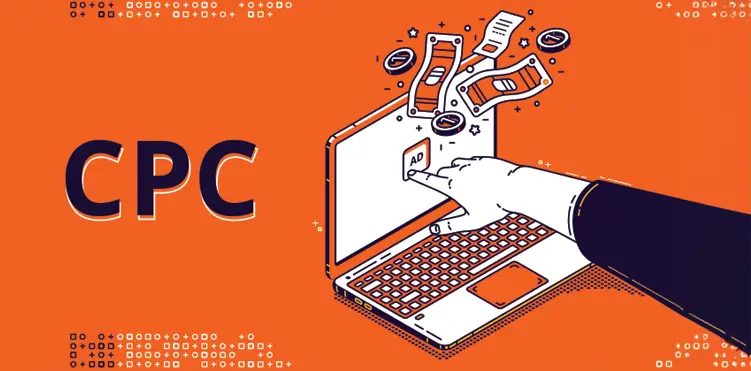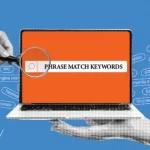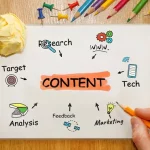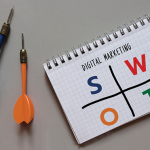How much you benefit from Google Ads depends on how cleverly you optimise your bidding strategies. Enhanced Cost Per Click (eCPC) is one such advanced bidding strategy that helps in maximising conversions and attaining better ROI. Enhanced Cost Per Click (eCPC) is a smart bidding strategy by Google Ads that allows you to have manual control over automated bidding. It follows a hybrid approach, combining the control of manual CPC with the intelligence of Google’s machine learning algorithms.
Unlike Manual CPC, which is all about static bids, eCPC is all about using automation and data analysis to tweak bids during ad auctions. It increases or decreases bids based on the probability of clicks that can result in sales.
How does eCPC work?
To understand how eCPC works, you need to understand how PPC bidding generally works. Bidding for a keyword in Google Ads means you are telling Google that you are willing to pay a certain amount to display ads for that keyword. In this scenario, you are telling Google the maximum CPC that you are willing to accept.
However, when it comes to eCPC, Google automatically adjusts the CPC based on the performance of your ads. This means, Google would increase your bids for high-performing campaigns and decrease your bids for under-performing campaigns. eCPC analyses various factors and previous campaigns using machine learning to adjust the bids accordingly and here’s how it works:
- Real-Time Adjustments: Google Ads monitors each auction in real-time and analyses factors like user behaviour, location, time of day, etc. If Google senses the click is more likely to convert, it will increase the bid and if not lower it.
- Close Variants And Keywords: eCPC works perfectly with keyword-matching strategies like broad match and exact match. This way, Google optimises the bids for relevant search queries.
- Conversion Tracking: For Google to work efficiently, it needs data from at least 15 conversions in your campaign. It is important to turn on conversion tracking for optimal results. Once Google identifies high-conversion opportunities, it adjusts the ad spend and bids accordingly.
Comparison With Other Strategies
- Manual CPC: Offers full control of spend without any automation. However, it requires constant monitoring. It is ideal for precise targeting or when on a tight budget.
- Enhanced CPC: Strikes a balance by offering partial automation. Perfect for balanced targeting and high conversions.
- Target CPA/Maximise Conversions: Ads are fully automated with no manual control. However, it requires extensive data. It is perfect for high-data campaigns with a flexible budget.
Benefits of Using Enhanced CPC
There are many benefits that make eCPC a popular choice among paid media experts. Below are some of them.
- High conversion rates: eCPC focuses on high-conversion clicks resulting in targeting users who are most likely to convert without a significant increase in costs.
- Improved ROI: Since the bids are adjusted automatically, it reduces ad spending and improves ROI by reallocating the budget to high-conversion bids.
- Cost-Efficiency: As mentioned above, along with improving ROI, eCPC minimises wasted ad spend by automatically lowering bids for clicks that are less likely to convert.
- Flexibility: Since it is not fully automated, advertisers would still have some control over the highest CPC bids without having to compromise on automated optimisations.
- Enhanced Reach: Google optimises close variants and long-tail keywords, considering user intent, device type, etc. This ensures your ads will reach relevant, high-potential audiences.
- Better Campaign Efficiency: eCPC simplifies ad management, especially when paired with programmatic advertising.
Drawbacks and Limitations
eCPC also has some drawbacks and limitations whilst offering unparalleled benefits.
- Conversion tracking: eCPC is nothing without accurate tracking. Google needs conversion history to make high conversion bid adjustments.
- Budget Limitation: Cannot work with tight budgets, especially in a volatile market.
- Unpredictability: Since it is automated, it comes with reduced transparency. Unlike Manual CPC, advertisers might not have precise control over bids.
When To Use And When Not To Use
eCPC is ideal for campaigns with moderate conversion data but insufficient for full automation. Similarly, while entering into a new market or while launching a new product, where buyer personas are unpredictable, eCPC is your best bet. eCPC can be used in volatile markets with fluctuating demand patterns as it requires constant bid adjustments.
eCPC is not ideal for campaigns with a limited budget that cannot handle potential bid increases. In niche low-competition markets where there are situations that require precise control over CPC, eCPC is not recommended.
Setting Up Enhanced CPC in Google Ads
Setting up enhanced CPC in Google Ads is relatively simple. Here’s a step-by-step guide on how to do it. As mentioned above, before setting up eCPC in your Google Ads campaign, it is important to make sure you have your conversion tracking on. There should be at least 15 conversions driven from the campaigns so that Google can track and have enough data to decide on what to bid (the more the better).
Once you’re done with it, go ahead with the below guide to implement eCPC.
Step-by-Step Guide:
- Sign in to your Google Ads account.
- Go to the campaigns session and select the campaign you want to optimise.
- Select enhanced CPC under the “Bidding” strategy options.
- Set your maximum CPC bid limit.
- Make sure conversion tracking is active.
- Save the changes.
- Now, monitor the campaigns regularly and change ad copies, if required.
Tips For Monitoring Performance For Optimal Results
- Keep track of metrics like Click-Through Rate (CTR), Cost Per Acquisition (CPA), and ROI
- Use tools like Keyword research to find high-performing keywords.
- Pair eCPC with dynamic search ads for precise targeting
- Conduct A/B tests on ad creatives and landing pages to help bid adjustments.
Practices For Maximising eCPC Performance
- Data is everything. Make sure all conversions are accurately tracked and verify the data to avoid wrong adjustments.
- A/B testing on ad creatives, landing pages, headlines, etc. will help you find high-conversion combinations.
- Find high-performing, intent-driven keywords using tools like Keyword Planner.
- Make sure to eliminate irrelevant queries for better targeting and to avoid wasted ad spend.
- Keep monitoring performance metrics like CPA, CTR, etc. without fail. Refine bids based on the insights.
- Use eCPC with programmatic advertising tools for better results.
- Use different keyword strategies like broad and exact-match keywords to expand reach and refine targeting.
Enhanced Cost Per Click strategy bridges the gap between fully automated and fully manual strategies. With eCPC, it is like getting the best of both worlds. It is a smarter way to bid at optimised costs. If you are still in doubt about how to go with it, ODigMa is always at your service! Get your paid media expert from ODigMa and optimise your Google Ads strategies to elevate your advertising game to the next level!
Frequently Asked Questions
1. What is the difference between Enhanced CPC and Manual CPC?
Manual CPC offers full control over bid adjustments. On the other hand, Enhanced CPC has automation features where bids are automatically adjusted by Google based on conversion history.
2. How does Google determine high-conversion clicks?
Google uses machine learning to analyse factors like historical data, factoring in user behaviour, location, device, and more to determine high-conversion clicks.
3. Can I use Enhanced CPC with other Smart Bidding strategies?
No. Enhanced CPC works independently. However, you can pair it with dynamic search ads like programmatic advertising.
4. Is Enhanced CPC suitable for small businesses?
Yes, eCPC is beginner-friendly and will work for small businesses as long as there is enough conversion data and a flexible budget.
5. What happens if my conversion tracking isn’t set up right?
Google requires adequate data to work efficiently. Without the right conversion tracking, optimisations of bids won’t be accurate and might target the wrong audience, leading to poor performance and wasted ad spend.
6. How do I monitor an eCPC campaign’s performance?
You can monitor the performance of the campaign by regularly tracking key performance metrics like CTR, CPA, ROI, and Quality Score in your Google Ads dashboard. Make sure to refine your keywords, ad copy, etc. based on these insights for optimal results.


 Enhanced Cost Per Click (e-CPC): An Improved Bidding Strategy For Your Campaigns
Enhanced Cost Per Click (e-CPC): An Improved Bidding Strategy For Your Campaigns Phrase Match Keywords: The Targeting Strategy You Need
Phrase Match Keywords: The Targeting Strategy You Need Decoding Digital Success Through Content Research and Analysis
Decoding Digital Success Through Content Research and Analysis SWOT Analysis In Digital Marketing
SWOT Analysis In Digital Marketing Why Is ORM In Digital Marketing As Important As Other Services?
Why Is ORM In Digital Marketing As Important As Other Services?